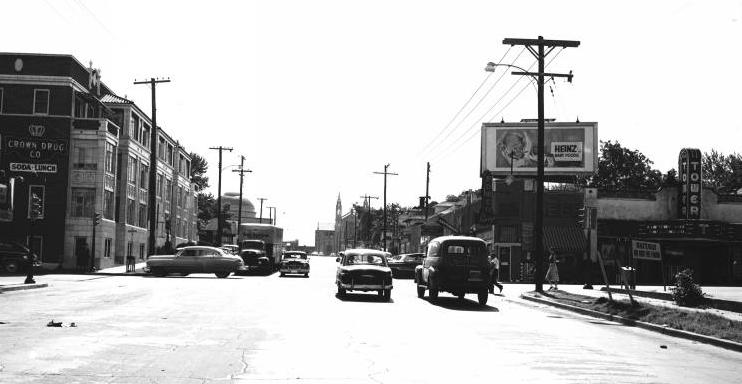
 Note the Tower Theatre. Looking east across Denver on 11th St./Route 66. Courtesy of the Beryl Ford Collection/Rotary Club of Tulsa
Reprinted courtesy of Scott Nelson, Tulsa World Web Editor, 3/28/2005.
Terrell Lester It was the corner of dreams. Some materialized. Some didn't. You could be nurtured, spiritually or bodily. You could partake from the pages of the Holy Bible or from the back of a grease-stained menu. You could watch Randolph Scott ride off into the sunset or watch a drunk stumble off into the darkness. More than a quarter-century ago, when Tulsans met for a good time, they met at the same place 11th Street meets Denver Avenue. For many, it was their corner of the world. There was a theater that later became an evangelist's pulpit and eventually the city's premier nightclub.
There was a neighborhood bar with a hot grill and cold beer. And there was yet another bar where bets were as plentiful as empty whiskey bottles on a Saturday night. All of this on one-quarter of an otherwise ordinary intersection. But soon, that corner, the southeast quadrant, will fade further into the mist of the mind. It will become just another corner, just another place in time. Twenty First Properties Inc. of Tulsa, which owns the land on the south side of 11th Street at Denver, recently announced plans to raze the existing buildings. That will remove another link to Tulsa's past, a time when liquor flowed freely despite laws to the contrary and when theaters showed movies for a quarter and sold popcorn for a dime. The corner gained instant respectability and credibility in 1937 with the opening of the Tower Theater at 1105 S. Denver Ave. It was billed, at the time, as Tulsa's finest suburban theater. It continued as a popular movie house until about 1958.
Soon, evangelist Billy James Hargis moved into the building and began to conduct soul-saving revivals. But it was spirits of another kind that uplifted the level of notoriety and popularity of the building and the corner. Jerry Osborn turned the theater-cum-tabernacle into a playhouse for musicians and nightowls, and he called it the Fondalite Club. "It was the nicest club in town," recalled Paula Hart, a weekend regular at the Fondalite. "It was the place to go. All of my friends went there." Osborn hired local bands and touring bands, and was open seven nights a week to a diverse collection of revelers. Perhaps the most notable musician who launched a career from the stage of the Fondalite was Charlie Daniels. Now a country-music giant, Daniels fronted his own band, the Jaguars, and played rock 'n' roll from 1964 through 1967 at the Fondalite. Another band of equal prominence that played the room was the Paragons, featuring Tony Twist. "The Fondalite was the hot spot in town," Twist recalled. "No other club in town could touch it." A fellow known only as Coy monitored the door nightly, and Osborn's wife, Mary, collected dollar cover charges from those who wanted their drinks on the rocks and their music to rock. There were no identification checks at the door of the darkened, split-level club and the closing-time schedule was irregular, at best. "That's because they weren't selling booze," Twist said with a wink. And that's just the way the Fondalite sold booze. By the wink. Legalized liquor by the drink did not become a reality until long after Osborn closed the Fondalite in 1968. Next door to that club was, and still is, Bowen's Lounge, one of Tulsa's oldest bars, and purveyor of sinfully delicious hamburgers. "The best in Tulsa," B.J. "Porky" Martin says with assurance. The front door of Bowen's opens directly toward the intersection. It always has been a beer-only bar, and its persistent stand against time has marked it as a Tulsa landmark. "I can't imagine Bowen's not being there," Twist said. "It's been there all my life." He recalled consuming bunches of burgers from the blackened grill around his gigs next door. Before 1 p.m. rehearsal sessions, Twist and his band members would secure a spot at the bar and settle in for lunch at Bowen's.
It was not as accessible as the other two clubs. It was a private club. No dollar cover was going to get you in here. You had to know someone to gain entrance. And that someone better be the person on the other side of the front door. Strangers never advanced past the scrutinizing eyes that glared through the peephole in the door.
Waitresses dressed in coquettish outfits, complete with black mesh stockings that supposedly conjured up memories of the 1890s. Gambling was one of the most popular pastimes in the Gay '90s. Placing an illegal wager at the bar was as easy as getting an illegal libation ... If you were a regular. As one of those regulars said, "I saw more bets on horse races there than I've seen at the tracks." The Gay '90s closed in the '80s, leaving only Bowen's and the Fondalite offshoots as the lone bars on the once renowned corner. Following the Fondalite closing, that room reopened as the Chaparral and now is named Carl's Place. The Cognito Inn flourished in the '70s on the northwest corner. A nightclub and restaurant, "The Cog" catered to an upscale crowd that sought privacy behind membership fees and locked doors. It was torn down in the '80s, giving way to a parking lot. On the north side of 11th Street, across from the Gay '90s, sat Baker's, an all-night restaurant that was a haven for the club crowd. It opened in 1959 and closed in the '80s. Today, the building houses a dry-cleaning business. Bowen's outlasted them all. But now, its days are numbered.
|